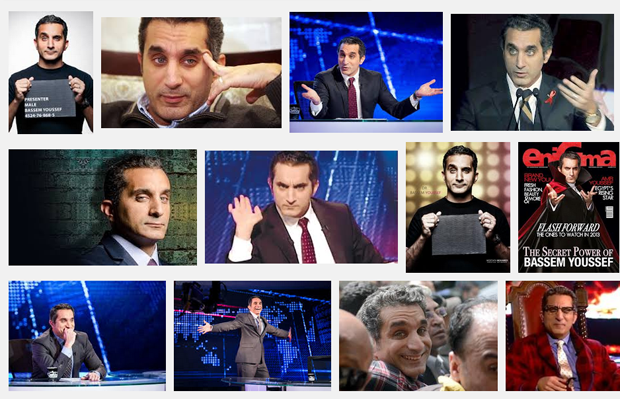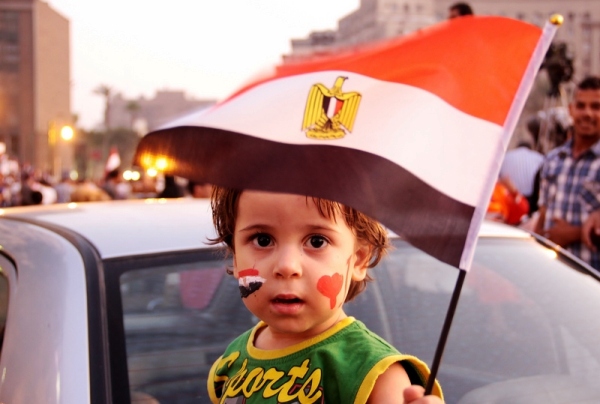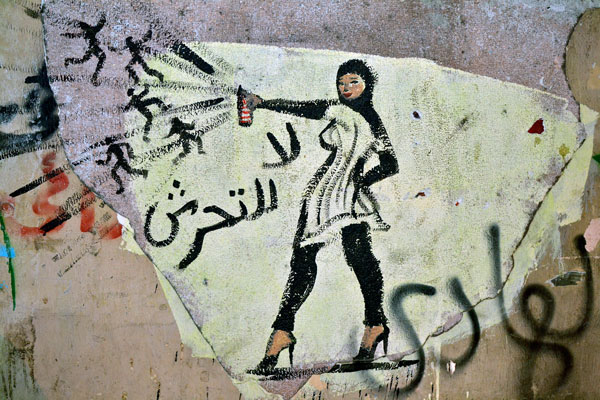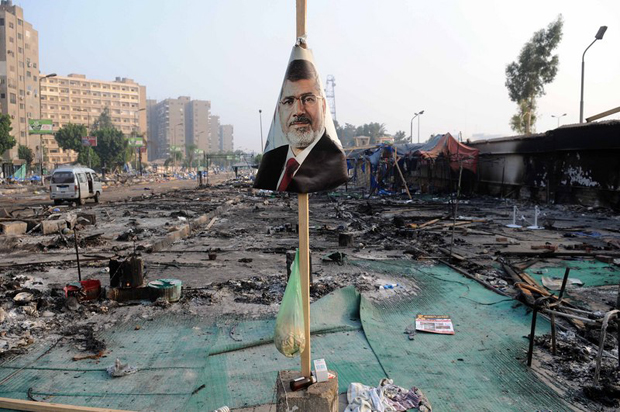Index relies entirely on the support of donors and readers to do its work.
Help us keep amplifying censored voices today.

After months away from the small screen, TV satirist Bassem Youssef is back on the air but it is uncertain how long he’ll stay. After a four month absence (Youssef’s disappearance coincided with the overthrow of Egypt’s first democratically-elected President by a military coup) he returned to the airwaves last Friday with a new episode of his weekly TV show Al Bernameg (The Programme). The episode sparked a new wave of controversy, reflecting the deepening divisions in Egyptian society.
Just 48 hours after the show was broadcast, the Public Prosecutor ordered an investigation into a legal complaint against Youssef, one of several filed by citizens angered by his mockery of the military chief. Others were upset by jibes he made at the former ruling Islamists. Youssef has been accused of “inciting chaos, insulting the military and being a threat to national security.”
Youssef is no stranger to controversy. He caused a stir when he mocked the now deposed Islamist President Mohamed Morsi on his show, broadcast on the independent channel CBC. At the time, several lawsuits were filed against him by conservative Islamist lawyers who accused him of “insulting Islam and the President” and Youssef consequently faced a probe by the Public Prosecutor. The charges against him were dropped several months later however. President Morsi was careful to distance himself from the legal complaints filed against Youssef, insisting that he “recognised the right to freedom of speech.” While the lawsuits did little to harm Youssef (in fact, they actually contributed to boosting his popularity and improving the ratings of the show), they did damage the image of the ousted President, who was harshly criticised for “intimidating and muzzling the press.” A couple of months before his removal from office, Morsi was accused by critics of “following in the footsteps of authoritarian Hosni Mubarak and of using repressive tactics to silence dissent.”
Now, under the new military-backed interim government, Youssef finds himself in hot water again. This time the TV comedian, known as Egypt’s Jon Stewart, is in trouble for poking fun at leaked comments by the Defence Minister, General Abdel Fattah al-Sisi, suggesting that the General would “find partners in the local media willing to collaborate to polish the image of the military.” In recent months, Youssef has maintained an objective and neutral position vis a vis the events unfolding in Egypt. In his articles published in the privately-owned Al Shorouk daily, he has expressed concern over the brutal security crackdown to disperse two pro-Morsi sit ins in Cairo on August 14, in which hundreds of Muslim Brotherhood supporters died. But he has also been careful to criticise the attacks on churches (often blamed on Islamists) following the coup.
Friday’s episode, which marked the start of a new season for the show, focused in part on the blind idolisation of al-Sisi by many Egyptians since the coup. The word coup was never once mentioned on the programme. In one scene, Youssef is seen putting his hand over the mouth of one of his assistants in an attempt to silence him as he utters the now-taboo word. In recent weeks, calls have grown louder for the General to run in the country’s next presidential election and a group of adoring fans has even begun collecting signatures for his candidacy.
The fact that Youssef is being prosecuted again after what many Egyptians consider was a “second revolution” signals that the June 30 revolt that ousted the Islamist President has failed to usher in a new era of greater press freedom .The lawsuits serve as a chilling reminder of the dangerous polarisation in the country, which some analysts warn may push it into civil war and chaos. While Youssef did take part in the June 30 protests that toppled Morsi, he has clearly decided not to take sides in this hostile environment. In an article published days before the show, he noted that many Egyptians advocate for free speech and democracy “as long as it is in their favor” but turn against you the minute your opinions differ from theirs. Aware that his episode had ruffled feathers, he sought to ease tensions with a message on Twitter that reminded his viewers, fans and critics alike, that at the end of the day, this is just “another episode in a TV show.”
This article was originally posted on 30 Oct 2013 at indexoncensorship.org

Image Adham Khorshed/Demotix
Egypt and China have always ranked poorly on press freedom. In 2013, Egypt ranked 158th while China ranked 173rd out of 178 nations in Reporters Without Borders Press Freedom Index. In recent months, a government crackdown on free expression in the two countries has shown disturbing similarities with repressive tactics used by the two regimes to silence dissent being invariably the same.
On a recent trip to Beijing, I was struck by how the authorities in both Egypt and China persistently use the media to serve their own interests and to tighten their grip on power. In both countries, opinion leaders, rights activists and critics who challenge those in power are perceived as “a national threat” and often become targets of intimidation, physical assaults, detention and sometimes, even death. The predicament of some journalists and bloggers in the two countries serves as a chilling reminder of the hazards media workers are subjected to as they strive to tell the story.
Thanks to heavy internet censorship in China — including the blacklisting of a host of foreign websites — the country has been described by free speech advocates as “a world leader in repression of the internet”. A draconian campaign against online “rumourmongers” has recently fuelled fears of even tighter government control on social media and online expression and increased self-censorship in China.
The so-called “anti rumour” campaign unveiled on 9 September allows Chinese authorities to arrest and jail internet users accused of “spreading false rumours” for up to three years. The ruling applies to internet activists who deliberately post what the government perceives as “false information” which is then shared by at least 500 others or is viewed at least 5,000 times. Critics warn the campaign will give the government an excuse to crush rights activists, bloggers and independent news providers who challenge the authorities or report abuses by the government as well as those demanding greater freedom and democracy.
In a widening crackdown on free expression in recent weeks , China has seen sweeping arrests of government critics, rights activists and opinion leaders accused of “disturbing public order”. While many of them remain in custody, 16-year-old Yang Hui–a school student who had been among the first group of bloggers jailed on charges of “spreading online rumours”– was released late September after spending a week behind bars in Gansu province. He remains under police surveillance however, and has been prohibited from speaking publicly. Yang was detained after questioning an investigation into the death of a man whose body had been found outside a karaoke club. Police had claimed that the man had fallen to his death from the building and had closed the case, but Yang insisted that the case should have been probed further. Moreover, he had posted comments daring the authorities to arrest him.
Repressive measures to silence dissent are not peculiar to the Chinese government. In recent days, a leaked video posted by activists on YouTube has shown Egyptian military generals discussing plans for a media clampdown similar to that imposed by the Chinese authorities . The footage — which appears to have been shot some months before Islamist President Mohamed Morsi was toppled: The video shows officers wearing winter uniforms — shows Defense Minister Abdel Fattah El Sissi addressing the officers . The recording starts with a senior officer urging El Sissi to re-establish red lines for the media and find new ways of “neutralizing media outlets”. He also calls on El Sissi to engage with owners of media outlets directly. “There are twenty to twenty five people controlling the media in Egypt, ” the senior officer notes. “We could either win them over or terrorize them”, he adds. El Sissi jokingly responds that he knows how to win them over but asks how he could possibly terrorize them?
That however does not rule out plans by the military generals to control the media. El Sissi acknowleges in the video that “we have been concerned with controlling the media” since the army took over power in February 2011. He goes on to affirm that the military was working on doing so and was achieving positive results but “we are yet to achieve what we want”, he says.
Since Morsi’s ouster, the tone of Egyptian media has shifted, reflecting the interests of those now in power. Print journalists and TV talk show hosts have persistently cheered on the powerful armed forces as “the guardians of the revolution” while demonizing the Muslim Brotherhood as a ” terrorist organization”.
Meanwhile, the military-backed interim government has cracked down on journalists covering the anti coup protests. In recent weeks, several journalists have reported harassment by police and soldiers including physical assaults, molestation, confiscation of their equipment and detentions. Worse still, journalists at the frontlines are getting caught in the crossfire. Mick Deane, a British Sky News cameraman, was shot and killed while covering the violent breakup of a pro- Morsi protest camp in Cairo in August. Egyptian Journalist Habiba Ahmed Abd Elaziz was also shot dead near the Rabaah al-Adawiya mosque in Cairo the very same day as security forces moved in on the pro- Morsi sit-in demanding the reinstatement of the toppled Islamist President. Abu Dra’aa , a Sinai-based journalist working with the independent Al Masry El Youm recently faced a military tribunal for a post on his Facebook wall suggesting that the military was misinforming the public about its offensive in Sinai. He was handed a six month suspended jail sentence. A number of other journalists including several working for Al Jazeera (which has been accused of being biased towards the Muslim Brotherhood) remain in custody. Several pro- Muslim Brotherhood channels (including Al Jazeera Mubasher) and Al Faraeen, a private channel owned by controversial talk show host Tawfeek Okasha, have been shut down. While the latter has recently been allowed back on the air, its temporary closure sends a powerful warning message to other channels to “adopt the pro-military state line or risk a similar fate.”
Meanwhile, the military has been using the media to fuel xenophobic sentiment: In remarks to state owned daily Al Ahram,after the brutal massacre outside the Republican Guard Headquarters in July, an unnamed military source warned that “the foreign press is inciting sedition between the army and people. ” With the surge in xenophobic sentiment gripping the country in the aftermath of the June 30 military takeover, foreign correspondents covering the Tahrir rallies commemorating the October 1973 War last Sunday expressed concern on Twitter about possibly being mistaken for “foreign spies”.
“There are rumours of a no-foreigner rule in Tahrir Square today. Can anyone confirm?” asked Louisa Loveluck, a freelance journalist based in Cairo . The BBC’s Middle East Correspondent Quentin Sommerville meanwhile posted a picture of himself near a military tank in Tahrir Square ahead of the protests with the sarcastic byline “foreign spy in Tahrir” before quickly deleting it , possibly for fear it may evoke unwarranted anger.
Nationalistic fervour and a rising tide of xenophobia are characteristics shared by all countries where autocratic regimes use the media to consolidate their grip on power. Egypt and China are no exception to the rule. The muzzling of the press through continued intimidation and the sweeping arrests of journalists, bloggers and rights activists bears testimony to the fact that neither country is serious about carrying out the desired democratic reforms.
This article was originally posted on 7 Oct 2013 at indexoncensorship.org

(Photo: Melody Patry / Index on Censorship)
Sexual harassment has been widespread in Egypt for decades but since the January 2011 uprising that toppled former President Hosni Mubarak, the problem has taken on epic proportions becoming what rights activists now describe as “an epidemic”. Not only has there been a dramatic increase in the number of harassment cases reported , but the level of violence too, is unprecedented with mob sexual assaults becoming rampant during street protests.
No fewer than 91 girls and women were reportedly gang raped and sexually assaulted in just four days during mass protests demanding the ouster of Islamist president Mohamed Morsi last July. Rights activists say the number of assault cases could be even higher as there is the possibility that some cases had gone unreported. Most of the attacks occurred in or near Tahrir Square in downtown Cairo where hundreds of thousands of opposition protesters had gathered to demonstrate against the Muslim Brotherhood president and later, to celebrate his downfall. Vicious mobs used metal chains, sticks , blades and knives to attack female protesters despite the presence of volunteer vigilante groups keeping an eye out for harassers.
In response to the surge in harassment, several civil society organisations have sprung up in recent months with the aim of curbing sexual assaults and protecting victims of harassment. One such organisation is the Anti-Sexual Harassment Campaign , an outreach movement set up in November 2012 to keep track of harassment cases and send teams of volunteers to protest sites to intervene in mob assaults. The organisation is just one of several movements monitoring protest sites and offering ‘safety advice’ to women. The emergence of such movements is evidence of the growing unwillingness to tolerate street harassment as public awareness about the problem increases .
Police in Egypt have meanwhile, formed a special unit of female police officers to combat street harassment in particular, and violence against women in general. While the unit is still small in size –consisting only of ten women—rights campaigners believe it is “a step in the right direction.”
“Often women victims of harassment are too ashamed to report incidents of harassment and sexual assault. In some cases , they are afraid of getting blamed”, Azza Kamel , founder and director of women’s rights organisation Appropriate Communication Techniques (ACT), said in an interview. “They may feel more at ease talking to another woman about the issue,” she added. Her organisation has run a hotline for eyewitnesses and women victims to report sexual harassment or assault cases which are known to increase and get more violent during public holidays and religious festivals.
Fatma Khafagy, chairperson of the National Women’s Council ‘s Ombudsman Office meanwhile, lamented that male security officers do not take sexual harassment seriously enough and at times, themselves harass women who come forward to report such incidents.
With a background in psychology, the women police officers have undergone training in communicating, listening and helping to rehabilitate victims of harassment and assault. “We encourage women to speak up and report harassment. They should not blame themselves for causing the harassment and must not hesitate in seeking justice”, said Colonel Manar Mokhtar, one of the officers at the new police unit for combating violence against women. “We also urge them to seek professional counselling that can help them recover from their traumatic experience.”
Victims of harassment often complain of a “culture of impunity” at the state level, saying that perpetrators often go unpunished for their crime. “But that is slowly changing with the growing awareness about the problem,” Khafagy noted.
She acknowledged the pressing and urgent need for legislation to counter the problem, given the surge in violence against women in Egypt, post revolution. A study conducted in April by the Egyptian Center for Women’s Rights revealed that 99.3 percent of Egyptian women have experienced some form of sexual harassment.
“In the absence of laws against sexual violence, we can only expect street harassment and sexual assaults to continue unchecked”, argued Khafagy.
A bill on violence against women that was recently drafted by the National Council for Women and was under discussion in the now-disbanded Shura Council, the upper house of parliament has been shelved due to the political instability.
Khafagy and other rights activists however, believe that legislation won’t be enough to tackle what they described as “a social scourge.”
“The answer lies in changing people’s attitudes. Educating women about their rights and getting men to realize the extent of the harm they inflict on the women is the only way that we can change existing behavioural patterns,” insisted Kamel. “But change cannot happen overnight; it takes time.”
For Egypt’s women victims of harassment, it cannot happen fast enough.

Egypt faced a new phase of uncertainty after the bloodiest day since its Arab Spring began, with nearly 300 people reported killed and thousands injured as police smashed two protest camps of supporters of the deposed Islamist president. (Photo: Nameer Galal / Demotix)
In a widening crackdown on dissent in Egypt since the military takeover on July 3, the Public Prosecutor’s office has reportedly been looking into legal complaints against thirty five rights activists and public figures for allegedly “receiving foreign funding”.
State sponsored Al Ahram newspaper said on its website on Saturday that private citizens had filed lawsuits against the defendants, accusing them of “accepting money from foreign countries including the United States”. According to the Al Ahram story, diplomatic cables leaked by the whistle blower website Wikileaks support the claims.
A judicial source had originally confirmed the story but the prosecutor’s office denied it the following day, calling on journalists to be “more careful and accurate in their reporting”. The defendants meanwhile, believe the ‘mistake’ was deliberate, insisting it was meant to intimidate them and to send a warning message to pro-democracy activists in Egypt to tone down their criticism of the military.
Prosecuting dissenters was common practice under deposed president Hosni Mubarak with regime loyalists often fabricating charges against opponents to silence them. The practice continued under toppled president Mohamed Morsi with his Islamist supporters frequently filing lawsuits against Muslim Brotherhood opponents to intimidate them.
The Al Ahram story triggered an uproar on social media networks Facebook and Twitter, with many internet activists expressing fears that following the brutal security crackdown on Morsi’s Islamist supporters, democracy activists who took part in the January 2011 uprising may be next in line.
Liberal politician Amr Hamzawi denied Al Ahram’s allegations as ‘untrue’ on Twitter, adding that “the campaign of fabrication and distortion must immediately stop”.
Gameela Ismail, a prominent member of the Al Dostour or Constitution Party–who was also among those accused–reacted angrily to what she described on Twitter as “fabricated charges” insisting she would in turn file a lawsuit against those who were “deliberately trying to defame her”.
The rumoured complaints have also fuelled fears of a severe security crackdown on civil society similar to the February 2012 crackdown on NGOs when 43 NGO staffers–including 32 foreigners–were indicted after accusations they were working for unlicensed institutions and receiving illegal funding. The notorious ‘foreign funding’ case dragged on for a year and a half, culminating in convictions for the defendants ranging between one and five years in prison and fines of 1000 Egyptian pounds.
Meanwhile, the arrests of a journalist and a rights lawyer last week has raised concerns about increased rights violations under the emergency law (now in place) allowing for the arbitrary arrests and detention of civilians without charge. Haytham Mohamedein, a leftist lawyer and rights activist was arrested near a military checkpoint in Suez on Thursday and accused of “spreading lies about the military and of belonging to a secret organisation that is planning attacks against the military and state institutions”. While Mohamedein was released the following day, it remains unclear whether the charges against him have been dropped.
Sayed Abu Draa, a North Sinai-based journalist with the independent Al Masry el Youm newspaper who was also arrested last week, has been referred to a military tribunal. He is being accused of “spreading false information about the armed forces and taking photographs of military installations”. A day before his detention, he had slammed the military in a Facebook post for what he described as “misleading information” by the army and the media on the ongoing military operations in Sinai.
In a protest rally organized by journalists outside the press syndicate in downtown Cairo on Monday, the demonstrators called for Abu Draa’s immediate release and for an end to what they described as ” attempts by the authorities to muzzle the press’.
“Freedom of journalists is a red line,” the protesters chanted. “No to military trials for civilians.’
In a crackdown on press freedom since the June 30 rebellion that ousted Mohamed Morsi, the new government this month closed down Al Jazeera Mubasher Misr along with three other networks it perceives as being pro-Islamist. The Administrative Court ruling to shut down the channels was based on charges that included “spreading false rumours and inciting violence.” Government officials claim Al Jazeera was broadcasting without a license –a charge the network denies.
While most state and independent media outlets have clearly aligned themselves with the military-backed government with TV presenters and talk show hosts using strong anti-Muslim Brotherhood rhetoric and advising viewers to support the army in its war against “the terrorists”, a few independent voices refuse to bow under intimidation and threats. They denounce what they describe as “the return of the police state” and are taking a firm stand against censorship.
This article was published on 11 Sept 2013 at indexoncensorship.org